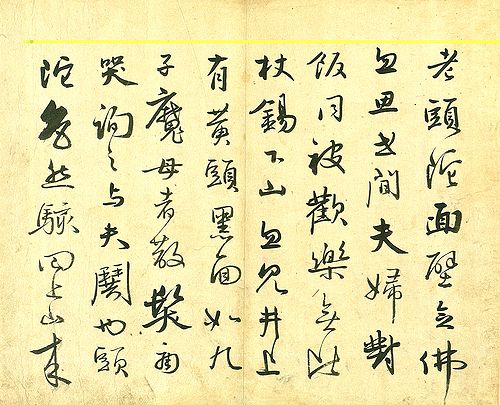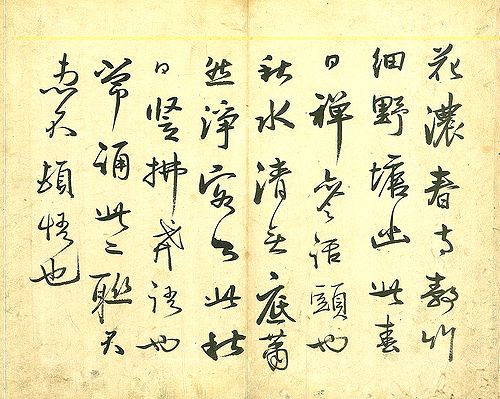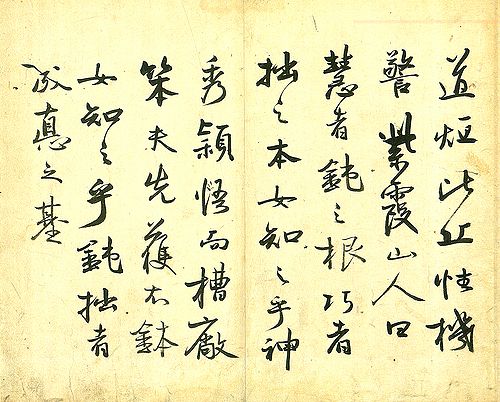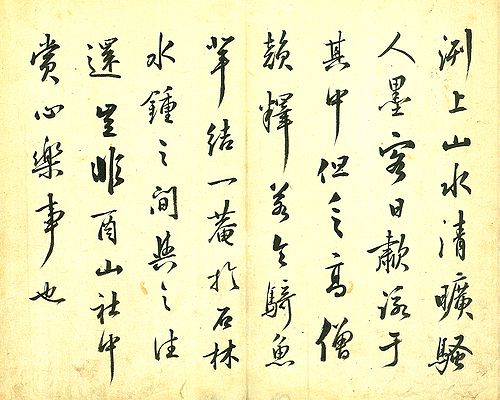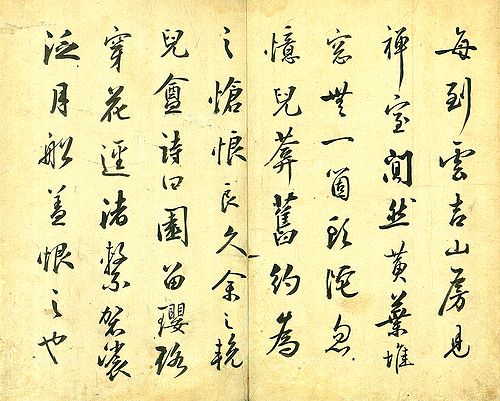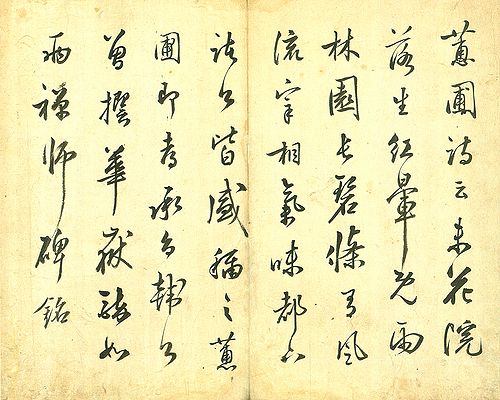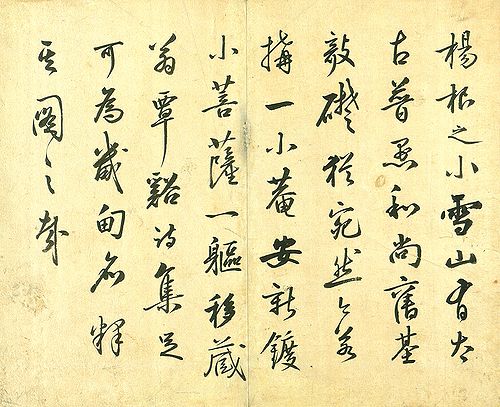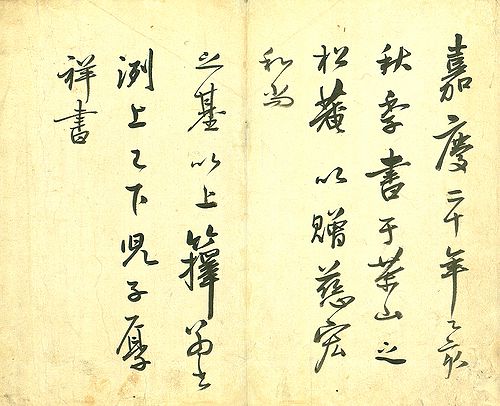"(Translation) 茶山 贈言帖"의 두 판 사이의 차이
Kanghunahn (토론 | 기여) (→Student 7 : Kanghun Ahn) |
Kanghunahn (토론 | 기여) (→Student 7 : Kanghun Ahn) |
||
| 119번째 줄: | 119번째 줄: | ||
Translation: Venerable Dohwon is sharp-witted. Jahasanin said: “Dullness is the root of wisdom; Clumsiness is the origin of ingenuity.” Do you know what it is? Monk Shenxiu was (considered) perspicacious.1) However, it was Monk Huineng who first inherited the legacy (lit. mantled alms bowl) from the master.2) Have you heard of it? (Therefore,) dullness and clumsiness is the foundation of achieving virtue. | Translation: Venerable Dohwon is sharp-witted. Jahasanin said: “Dullness is the root of wisdom; Clumsiness is the origin of ingenuity.” Do you know what it is? Monk Shenxiu was (considered) perspicacious.1) However, it was Monk Huineng who first inherited the legacy (lit. mantled alms bowl) from the master.2) Have you heard of it? (Therefore,) dullness and clumsiness is the foundation of achieving virtue. | ||
| − | 1) This perspicacious-ness is deeply engaged with the Chan notion of "sudden enlightenment (頓悟)." Zen Master Shen Xiu (?~706) was a Tang Buddhist monk, who is considered as the progenitor of the Northern Chan Order (北宗禪). | + | 1)This perspicacious-ness is deeply engaged with the Chan notion of "sudden enlightenment (頓悟)." Zen Master Shen Xiu (?~706) was a Tang Buddhist monk, who is considered as the progenitor of the Northern Chan Order (北宗禪). |
| + | |||
2) Zen Master Huineng (638~713) was a Tang Buddhist monk, who is the sixth patriarch of Chan Buddhism, and also founding father of the Northern Chan Order (南宗禪). | 2) Zen Master Huineng (638~713) was a Tang Buddhist monk, who is the sixth patriarch of Chan Buddhism, and also founding father of the Northern Chan Order (南宗禪). | ||
2017년 7월 9일 (일) 23:20 판
| Primary Source | ||
|---|---|---|
 |
Title | |
| English | Dasan’s advice to a Buddhist Monk (Jahong 慈弘) | |
| Chinese | 茶山의 贈言帖 | |
| Korean(RR) | 다산의 증언첩 | |
| Text Details | ||
| Genre | Literati writings | |
| Type | ||
| Author(s) | 茶山 丁若鏞 | |
| Year | ||
| Source | ||
| Key Concepts | ||
| Translation Info | ||
| Translator(s) | Participants of 2017 Summer Hanmun Workshop (Advanced Translation Group) | |
| Editor(s) | ||
| Year | 2017 | |
목차
- 1 Introduction
- 2 Original Script
- 3 Translation
- 3.1 Student 1 : Irina
- 3.2 Student 2 : Masha
- 3.3 Student 3 : Jong Woo Park
- 3.4 Student 4 : King Kwong Wong
- 3.5 Student 5 : Kim Young
- 3.6 Student 6 : Zhijun Ren
- 3.7 Student 7 : Kanghun Ahn
- 3.8 Student 8 : Martin
- 3.9 Student 9 : Hu Jing
- 3.10 Student 10 : Young Suk
- 3.11 Student 11 : (Write your name)
- 3.12 Student 12 : Do hee jeong
- 3.13 Student 13 : (Write your name)
- 3.14 Student 14 : (Write your name)
- 4 Further Readings
Introduction
Original Script
Translation
Student 1 : Irina
- Discussion Questions:
Make difference between values in Buddhist world and values in our world.
--How about: "What are the fundamental differences between the goals of a Buddhist monk and the secular pursuits of a Confucian scholar?" (SJY)
Student 2 : Masha
- Discussion Questions:
What is the role of nature in Buddhist training? How is it opposed to daily life?
---How about: "What roles does nature play in the Buddhist method of self-improvement? How does the monastic life of a Buddhist monk compare with the secular life of lay people? (SJY)
Student 3 : Jong Woo Park
- Discussion Questions:
(1) What might be the power dynamic between Buddhist monks and Confucian literati in the late Chosŏn period? (2) What kind of feeling does Chŏng, a talented but ostracized yangban, share with a local Buddhist monk, Jahong?
Student 4 : King Kwong Wong
洌上山水淸曠, 騷人墨客, 日歗詠于其中. 但乏高僧韻釋. 若令騎魚輩, 結一菴於石林水鍾之間, 與之往還, 豈非酉山社中賞心樂事也.
Along Yŏlsu[1], the rivers are clear and the mountains are extensive. From day to day, poets and writers recite and chant [their poems] in between [the rivers and mountains]. But they lack lofty priests and rhyming monks. If asking Ki-Ŏ and his friends to build a hermitage between the Stone Forest and the Water Bell[2], and to socialize with the poets and writers, isn't this a delightful matter that pleases the hearts of those in the literary society of Yusan?
- ↑ Yŏlsu 洌水 is the old name of the Han River. It is also the pen name of Chŏng Yag-yong.
- ↑ The Water Bell refers to Sujongsa (Water Bell Temple).
- Discussion Questions:
- If we consider Buddhists were stigmatized in the Choson society, how can we explain Chŏng Yag-yong's relationship with Buddhist monks?
- Given the example of Chŏng Yag-yong, were all Confucian scholars well-versed in Buddhist ideas?
Student 5 : Kim Young
- Discussion Questions:
1. Why do you think Jeong Yag-yong is skeptical of sudden enlightenment? What kind of negative effect can it have on men?
2. How important is beautiful scenary in jeong Yag-yong's idea of meditation? How does he use language to describe the scenery effectively?
Student 6 : Zhijun Ren
- Discussion Questions:
What does Dasan’s defense of gradual enlightenment against sudden enlightenment tell us about the interaction between Buddhism and Confucianism in Chosŏn society? Given that Buddhism, in general, was oppressed during Chosŏn dynasty, what Dasan, a prominent Confucian, and his active engagement with Buddhism tell us about the mutual penetration during Chosŏn.
Student 7 : Kanghun Ahn
- Discussion Questions:
His calligraphic style seems to be quite similar to that of Mifu. Granted that he corresponded with a Chan monk through these letters, did he really take on such style based on that?
Translation: Venerable Dohwon is sharp-witted. Jahasanin said: “Dullness is the root of wisdom; Clumsiness is the origin of ingenuity.” Do you know what it is? Monk Shenxiu was (considered) perspicacious.1) However, it was Monk Huineng who first inherited the legacy (lit. mantled alms bowl) from the master.2) Have you heard of it? (Therefore,) dullness and clumsiness is the foundation of achieving virtue.
1)This perspicacious-ness is deeply engaged with the Chan notion of "sudden enlightenment (頓悟)." Zen Master Shen Xiu (?~706) was a Tang Buddhist monk, who is considered as the progenitor of the Northern Chan Order (北宗禪).
2) Zen Master Huineng (638~713) was a Tang Buddhist monk, who is the sixth patriarch of Chan Buddhism, and also founding father of the Northern Chan Order (南宗禪).
Student 8 : Martin
- Discussion Questions:
1. Besides giving advice to Buddhist monks seeking enlightenment, how does Tasan portray the non-buddhist world?
Student 9 : Hu Jing
- Discussion Questions:
1. How was the relationship between Dasan and Monk Jahong? Besides Jahong, did Dasan make acquaintence with other monks? Was there any network among those people?
2. Did Monk Jahong ever give respose to Dasan? and can we find any reference source?
Student 10 : Young Suk
每到雲吉山房, 見禪室閴然, 黃葉堆窓, 無一箇頭陀. 忽憶兒葊舊約, 爲之愴悢良久. 余之輓兒盦詩曰: “園留瓔珞穿花逕, 渚繫袈裟泛月船.” 盖恨之也.
When I reach the Hermitage of Cloud Delight Mountain
Each time I see the meditation room so hollow.
The stacks of yellow leaves on the window sill
Not a single monk ever shown.
Suddenly I remember the old promise
With Aam. Thus I stay for a long lamenting.
In memory of Aam I wrote this verse:
"Piercing the flowery paths your bead necklace is still there,
and your monk robe is still hanging on a moonlit boat."
I was overwhelmed by sorrow.
- ‘old promise with Aam': Dasan met the monk Aam Hyejang (兒菴 惠藏, 1772~1811) during his exile in Kangjin in South Chŏlla Province. Becoming good friends they promised each other that someday they would come to live together in the hermitage of Un'gil (cloud delight) mountain. This promise was not kept due to Hyejang's death at age forty. Dasan now tells the story to Chahong (慈弘), one of Hyejang's disciples.
- Discussion Questions:
What is Dasan's idea of dull and slow vs sharp and quick cultivation of mind? How is it related to Nature?
Student 11 : (Write your name)
- Discussion Questions:
1. What is the intention of Dassan writing these poems? What are the messages of Dasan to people, not just monks? 2. Nature is the constant source of poems. What did Dasan mean by using nature as a metaphor? 3. How did Dassan perceive Buddhism? What is his relationship to buddhist monks?
Student 12 : Do hee jeong
- Discussion Questions:
종교문제로 유배를 간 사람이 왜 불교에 대해서 논하였는가? why he said buddhist word? he exile cause religious problem
Student 13 : (Write your name)
- Discussion Questions:
Student 14 : (Write your name)
- Discussion Questions:
